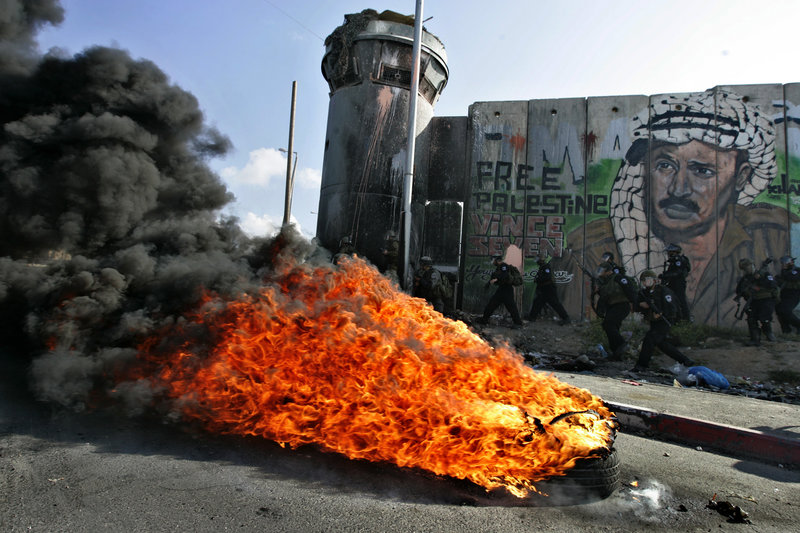JERUSALEM – Masked Palestinians whirling slingshots clashed with Israeli riot police in two Arab neighborhoods of Jerusalem on Saturday after the shooting death of a teenage stone thrower. It was a sign of rising tensions on the eve of Palestinian commemorations of their uprooting during Israel’s 1948 creation.
The possibility of escalation comes at a critical time for U.S. Mideast policy. President Obama’s envoy to the region, George Mitchell, a former Maine senator, resigned Friday, and the U.S. president may now have to retool the administration’s incremental approach to peacemaking. Obama is to deliver a Mideast policy speech in the coming week.
Mitchell held the job for more than two years, but had little to show for it. Israeli-Palestinian talks resumed in September, but were quickly derailed by Israel’s refusal to comply with an internationally mandated construction freeze in Jewish settlements in the West Bank and east Jerusalem, war-won territories Palestinians want for their state.
Israelis and Palestinians on Saturday praised Mitchell and blamed each other for the failure of his mission.
Palestinian officials argued that Mitchell was destined to fail because of what they said is a faulty U.S. premise — that Israelis and Palestinians are equals who can be nudged by a persistent mediator. As the occupier, Israel holds all the cards and only U.S. pressure on Israel will yield results, said Nabil Shaath, a veteran negotiator.
“Mitchell was good and skillful, but what could his personal skill have done as long as he didn’t get the required support from the administration, to exert the required pressure?” Shaath said Saturday.
Israeli Prime Minister Benjamin Netanyahu spoke to Mitchell by phone Saturday.
Netanyahu expressed sorrow over Mitchell’s decision to step down and “over the fact that the Palestinians refused to come to the talks that Mitchell worked to promote,” according to a statement by Netanyahu’s office. “They insisted on endless preconditions that hindered his work and, at the end of the process, joined Hamas.”
Despite the deadlock, dramatic changes in the region in recent months, including democratic uprisings in Tunisia and Egypt and a Palestinian unity deal between rivals Hamas and Fatah, have been shaping the Israeli-Palestinian conflict.
The Egyptian-brokered reconciliation deal restored President Mahmoud Abbas’ position as the leader of all Palestinians and strengthened his bid to sidestep a negotiated deal with Israel and instead seek U.N. recognition of Palestinian statehood.
Abbas told the Rome daily La Repubblica in an interview published Saturday that if Israel doesn’t want to negotiate with a new Palestinian unity government that includes Hamas, “we’ll go to the U.N. in September and ask if our people, which is again united, finally has the right to be a state.”
With much at stake, it appears unlikely that Abbas’ security forces will allow today’s commemorations to get out of hand.
The day marks the anniversary of what the Palestinians call the “nakba,” Arabic for “catastrophe,” referring to their displacement during the Mideast war.
Send questions/comments to the editors.



Success. Please wait for the page to reload. If the page does not reload within 5 seconds, please refresh the page.
Enter your email and password to access comments.
Hi, to comment on stories you must . This profile is in addition to your subscription and website login.
Already have a commenting profile? .
Invalid username/password.
Please check your email to confirm and complete your registration.
Only subscribers are eligible to post comments. Please subscribe or login first for digital access. Here’s why.
Use the form below to reset your password. When you've submitted your account email, we will send an email with a reset code.